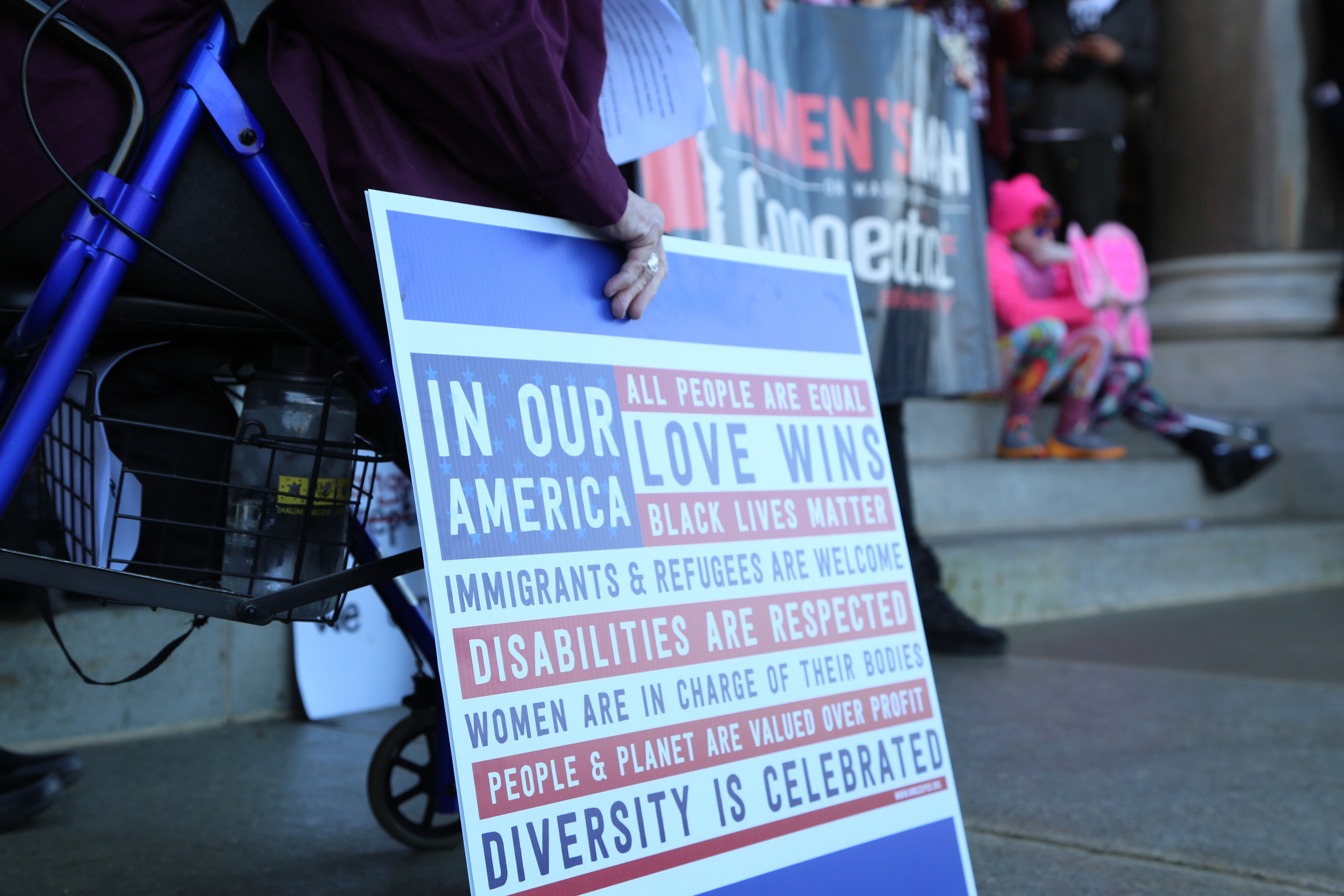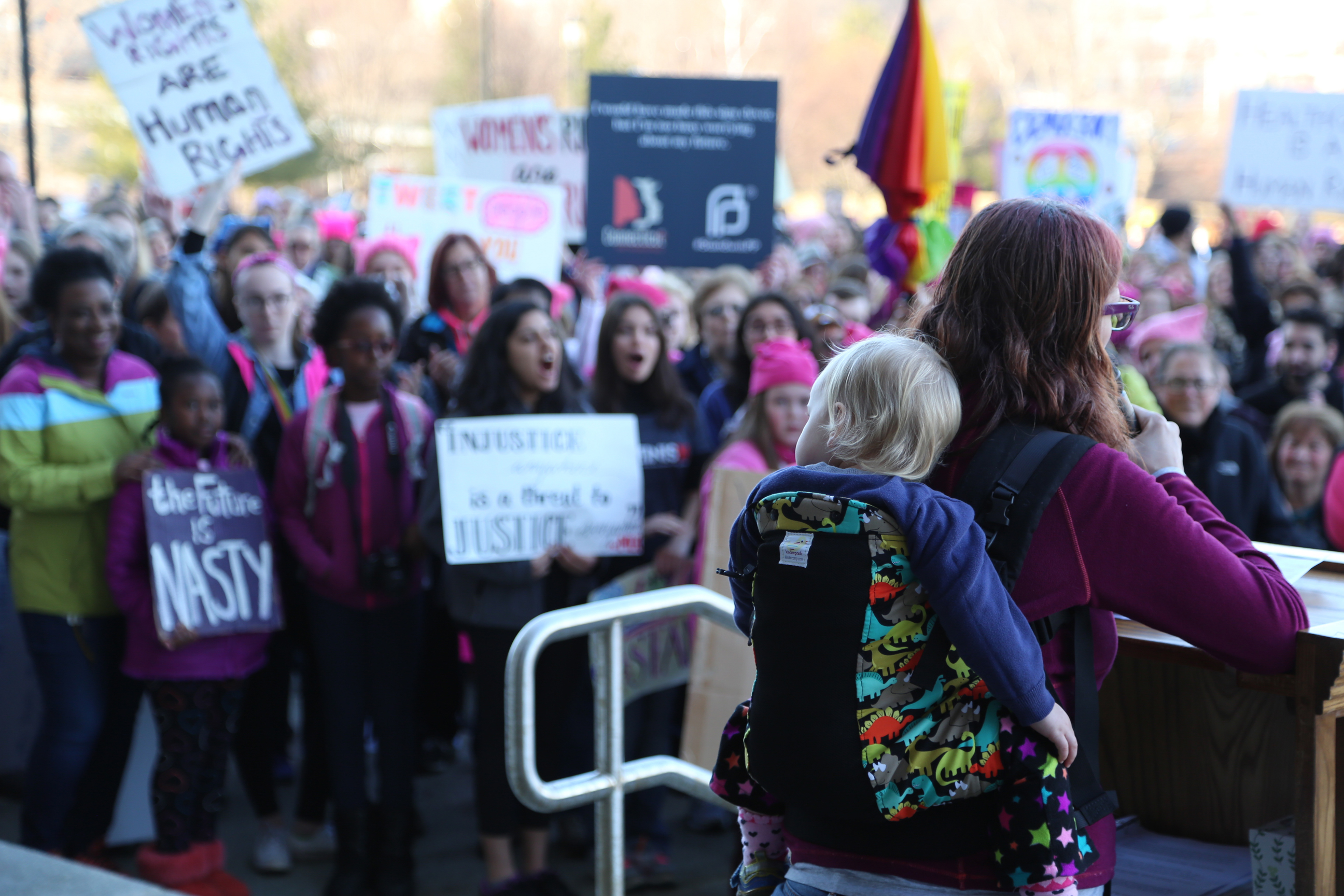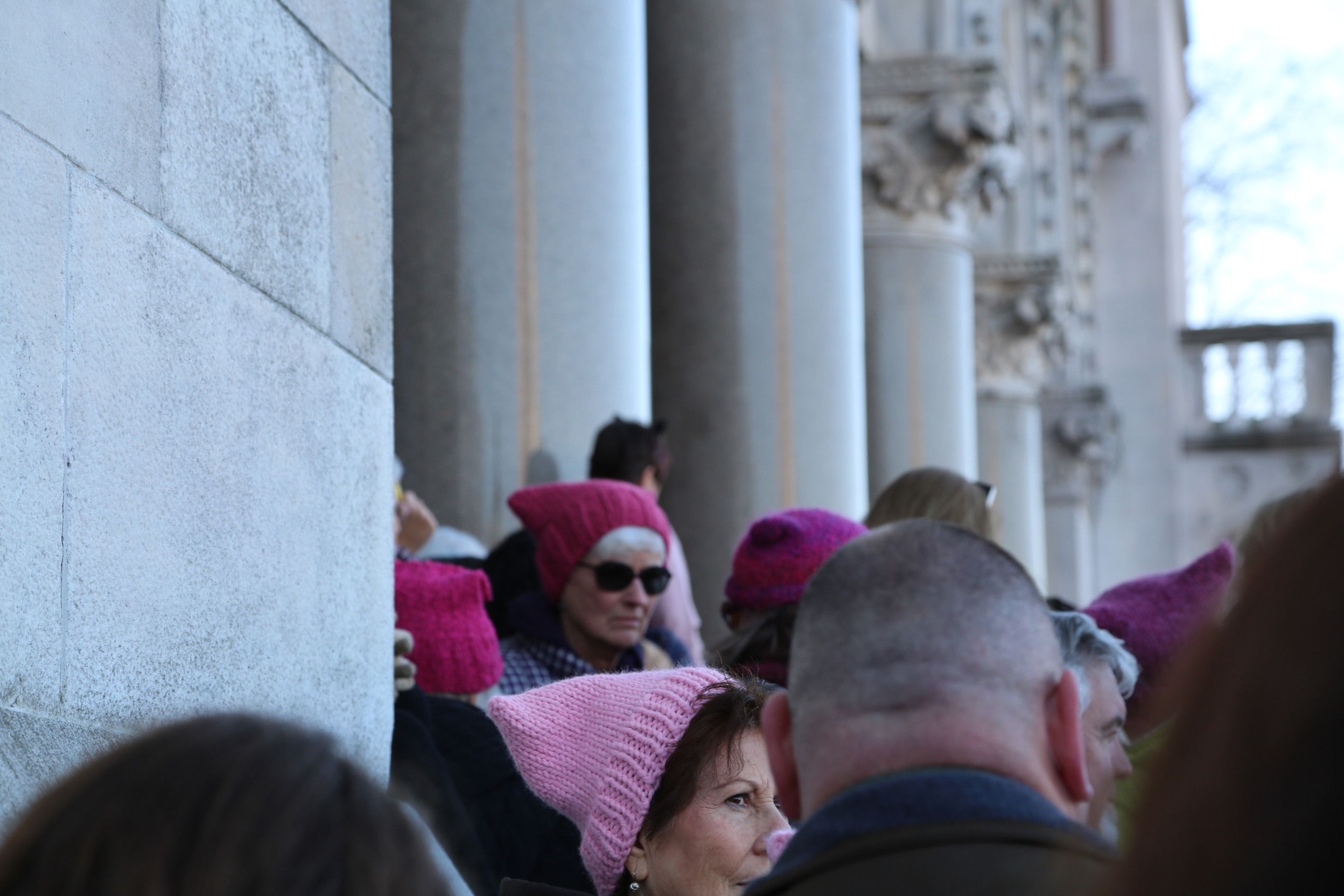A week in the White House
At Yale, in New Haven and across Connecticut, local organizations have stopped bracing for impact. As the Trump administration makes its policy plans clear, groups invested in reproductive rights and immigrant rights have begun a four-year fight.
* * *

At first, Sharlene Kerelejza thought she’d be spending the day after President Donald Trump’s inauguration with a hundred others, listening as five or six speakers passed around a bullhorn. Instead, over 10,000 gathered on the steps of the state capitol building in Hartford on Jan. 21. “It grew so fast — first by 100 folks a day, then by 500 folks a day,” said Kerelejza, executive director of Meriden-Wallingford Chrysalis, an organization offering support and shelter to victims of domestic violence. She organized the event on Facebook along with five others. They had to turn away many interested speakers and performers, and the event ran an hour over the intended duration. One of over 600 marches worldwide, the Women’s March on Hartford was blanketed in homemade signs, of the same type held by 3.2 million Americans across the country. They ranged from feminist inspiration (“Women’s rights are human rights,” “Complacency is a far more dangerous attitude than anger”) to blunt and devastating honesty. One sign, detailing opposition to the repeal of the Affordable Care Act, read “I have stage 4 cancer. Still I rise.” Another neon pink sign read “We Won’t Go Back.” A slim black coat hanger was drawn alongside the phrase.
“Nasty women from all walks of life,” as one speaker put it, had gathered in Hartford, motivated by a wide range of grievances, fears, and hopes for the next four years. Speakers discussed immigration, disability rights, LGBTQ rights, a rise in hate crimes directed at Muslims and the fear of nuclear war. Yet, the crowd seemed energized to fight for every cause mentioned. In Washington, the effect was largely the same. Maraya Keny-Guyer ‘19, president of Reproductive Justice Action League at Yale, who attended the march in the capital, called it “inspiring to be a part of a crowd of women and men and nonconforming individuals fighting for a common purpose. You were surrounded by determination and hope.”
But after the marchers across the country and the world put down their signs and went home, a question emerged, posted in the Facebook events used to organize the rallies. Where should those 3.2 million, participants in the largest inauguration demonstration in history, go from here? In the short week since his inauguration, President Trump has signed or drafted four executive orders and eight presidential memoranda that have alarmed many of those who marched for reproductive rights and the protection of immigrants. Across the state, community-based organizing groups have begun to mobilize just as quickly in response.
* * *
On Monday, in a presidential memorandum, Trump reinstated the “Mexico City” abortion policy, also known as the “global gag rule.” Blocking the use of U.S. taxpayer funds towards foreign NGOs that, among their services, perform or promote abortions, it has been rescinded by Democratic presidents and reinstated by Republican presidents since its implementation by Ronald Reagan in 1984. Speaking for herself and for RALY, Keny-Guyer called Trump’s presidency “anti-abortion and anti-women,” and the policy change “dangerous,” citing studies that showed a rise in abortion rates as contraceptive use declined abroad under the Mexico City policy during the George W. Bush administration.
However, Keny-Guyer also believes that the “real world consequences” of Trump’s inaugural moves have pushed activist groups like RALY to continue their efforts. “We’re disheartened, but not pessimistic.” Sarah Croucher, executive director of NARAL Pro-Choice Connecticut, echoed Keny-Guyer at the Hartford march, telling the crowd, “This is not the time for complacency!” Croucher spoke with her young daughter strapped to her back. “When she grows up,” Croucher said, “she’ll have less access than I have.”
Speaking by phone later in the week, Croucher said that she has been surprised by several anti-choice bills proposed already this session in the Connecticut state legislature, musing that some lawmakers may have felt “emboldened” by the strong anti-abortion stance taken by the federal government. On Monday, she joined Democratic lawmakers proposing a legislative package of five bills united around women’s healthcare. One bill aims to continue the protection of preventative services under the Affordable Care Act; another aims to fight medically unrelated restrictions on abortion. The group wants to make sure that the key provisions of the U.S. Supreme Court decision in “Whole Woman’s Health v. Hellerstedt,” a June 2016 ruling favoring abortion rights, remain in state law. Keny-Guyer mentioned that this semester, the organization is hoping to mobilize Yale students to support legislation of this kind. RALY plans to participate in phone banking events with NARAL, as well as Planned Parenthood, in addition to volunteering and protesting.
NARAL itself will continue to encourage its members and the greater public to call and email state representatives and senators. The organization saw public engagement level off into December, increasing in January around the inauguration. “People are looking for how to get involved. As people mobilize, they connect with us. They can go out and be activists,” Croucher said, citing a town hall meeting in Middletown, held on Jan. 25 by state Sen. Len Suzio, of Connecticut’s 13th State Senate District. Suzio is personally introducing Proposed H.B. 5566, which would require parental notification for minors seeking abortions. Over 300 showed up in protest. “Connecticut voters support choice, they support reproductive rights, they support Planned Parenthood in particular,” said Croucher.

* * *
Two of Trump’s four executive orders took aim at immigrants, provoking a strong response from New Haven activists, especially as Trump begins to back up a threat to restrict federal funding to sanctuary cities. In these areas, local law enforcement and officials will not aid federal immigration officers in enforcing federal immigration law. New Haven has claimed the title for 11 years.
One executive order increases border security measures, directing the secretary of Homeland Security to identify funding for Trump’s signature campaign promise: a border wall with Mexico. Trump also included the construction of detention facilities, the hiring of 5,000 additional Border Patrol agents and the empowerment of state and local law enforcement officers to act as immigration officers.
Another order, signed on Wednesday, directed the secretary of Homeland Security to prioritize the deportation of immigrants living in the country without documentation charged or convicted of a crime. The order prohibits federal funding to sanctuary cities, and reinstates the Secure Communities program, enabling state and local law enforcement to act as federal immigration agents. It directs the hiring of 10,000 immigration officers hired at U.S. Immigration and Customs Enforcement, and sanctioning of countries that refuse to accept the return of immigrants deported under this policy. The order would also see a list created, and updated weekly, of crimes committed by immigrants without documentation in sanctuary cities.
In New Haven on Thursday, Jan. 26, Mayor Toni Harp rejected the President’s order. Speaking from the steps of City Hall to a crowd of a couple hundred, Harp decried a “growing sense of fear and unrest” among her constituents. She declared the city of New Haven’s priority — and first response — to safeguard the wellbeing of residents. “New Haven police officers, school district employees, and other city workers do not — and will not — act to enforce federal immigration law,” Harp said.
However, the executive orders did not catch City Hall or immigrant rights activists off guard. Harp met with Ana Maria Rivera, director of advocacy at JUNTA for Progressive Action, right after the election. Since then, a sanctuary city working group has met five times. Originally led by JUNTA and Unidad Latina en Acción, the working group has grown to include Integrated Refugee and Immigrant Services, New Haven Rising, New Haven Legal Assistance and other organizations, in addition to representatives of the mayor’s office, New Haven Public Schools, and the police department.
Two days before Harp’s speech at City Hall, the working group met to focus on a specific, recent issue. Fearing deportation raids, parents in the city have stopped sending children to school, said Fatima Rojas, a member of ULA, at the meeting. Harp concurred at the Thursday night rally. She argued that fear among a wider swath of New Haven residents, causing reluctance to send children to school, does more harm than violations of federal immigration law. Urging residents, including migrants, to follow their daily routine, Harp stated, “New Haven remains a safe haven for all those who live here.”
Rivera aims to add awareness to the daily routine of both children and their parents. JUNTA has held community defense workshops called “Know Your Rights” in two schools in New Haven. So far the organization has worked at Fair Haven and Hill Central, but “our idea is to go anywhere and everywhere, anyone that wants us to come in.” Many parents attended the events, as the schools sent out flyers and robocalls. At Fair Haven, students from an English as a Second Language class performed skits on the eponymous theme. Typically, the workshop presents different scenarios in a potential raid or immigration case, then asks workshop participants what they’ve learned — “what you do right, what you do wrong.”

“It’s a little heartbreaking that we have to have these conversations with kids as young as they are, but I think it’s important that if a young person learns that at school, they might tell their parents, don’t open the door unless there’s a warrant,” said Rivera. “They knew their rights better than anyone else there,” she said of the students.
According to a statement from Mayor Harp, a team of Board of Education members has been investigating the legality of ICE agents entering schools. She stated that the team has found that both state and federal laws protect students who wish to attend public schools without documentation. To enter a public school, ICE agents must have warrants. And, if Harp’s statements on Thursday and the city’s past policy hold fast, local police officers will not aid them.
The sanctuary city working committee also seeks to codify the status quo with law enforcement. The committee is currently working to update 2006’s general order, which restricts law enforcement from asking an individual about their immigration status. The committee is also drafting a resolution with members of New Haven’s Board of Alders. Initially, its purpose was to reaffirm New Haven’s status as a sanctuary city, and set out steps for city employees accordingly. But, given the recent executive orders, Rivera said, “We might have to shift a little bit… mention something about the direct attack against our city.”
* * *
At Integrated Refugee and Immigrant Services, a New Haven based nonprofit, Kelly Frank is waiting for her own call to shift. Now a development specialist, Frank spent 10 years at IRIS as deputy director. After the executive orders on immigrants, Frank says IRIS is “dreading the announcement of the draft [of the presidential memorandum] that related more specifically to refugees.” Leaked on Wednesday, the memorandum contains instructions to halt entry of refugees from seven countries including Syria, if it is signed.
For the moment, IRIS is proceeding “full steam ahead” with their regular programs for refugees, welcoming a family from Syria yesterday. Frank emphasized that IRIS will determine how to react if the memorandum is formalized, but did state that the direction of the leaked draft would be “absolutely devastating” for the refugee resettlement program. “We can’t speak out against that strongly enough,” said Frank.
This week has been extremely busy at IRIS, as the staff fielded calls and emails from people asking how to help. The organization has been encouraging callers to contact the White House, to show “widespread support” for refugee resettlement. In 2016, IRIS welcomed 530 individuals, more than double the previous year’s count of 242. According to Frank, this was only possible due to community support across the state, such as co-sponsoring of refugees from community-based groups. “We’re stronger as a state,” she said. IRIS will soon release a joint statement with Bridgeport’s International Institute and Hartford’s Catholic Charities Refugee Resettlement condemning the presidential actions. The statement argues that they “go against the fabric of our nation.” The three agencies also plan to capitalize on their close working relationship to advocate, through Sens. Chris Murphy and Richard Blumenthal LAW ’73, in Washington.
Student groups also plan to increase partnerships with Elm City activists. In a statement made January 25, titled “A Letter to President Donald Trump,” the Yale Refugee Project urged President Trump to accept an invitation to visit IRIS “and meet the refugees who have sought refuge here and have become patriotic members of our country.” Rosa Shapiro-Thompson ‘19, YRP’s advocacy and awareness coordinator, told the News that the organization publicized the event to its members. She told the News that the YRP is “preparing for a long fight, both for the continued resettlement of refugees in the country and for the protection of our local refugee community here in New Haven.”
Rita Wang ‘19, political action coordinator at the Yale Women’s Center, believes “Yale student issues and New Haven resident issues go hand in hand, and we as campus activists have to do both to help erase the Yale-New Haven dichotomy.” Wang reached out to ULA to support New Haven residents who wanted to attend the Women’s March on Washington. Many members of the Women’s Center have expressed interest in organizing nights of support for Planned Parenthood to write postcards to senators, an effort Wang intends to coordinate. She is also thinking of trying to revive the Student Group Coalition at Yale, an attempt by the Yale College Council, Dwight Hall, the Co-op and the Women’s Center to hold bi-weekly meetings for campus activist groups.
“Because of the new administration, I hope to do some soul searching and structural reworking with the rest of campus activists to see how to better do our work,” said Wang. “I do think that some of the old things that we were used to under the Obama administration are not going to happen anymore. We’re fighting against much scarier people now.”
* * *
Even before the election, which caused a definite spike in street marches, City Hall played host to several protests or community meetings each month in New Haven. Ana Maria Rivera believes activism moves more rapidly in the Elm City, an effect of “years and years of struggle, real organizing by the people that are most impacted,” together with a friendly administration since 2005. Through the Connecticut Immigrants Rights Alliance, JUNTA has been working with other organizations across the state to advocate for immigrants in their cities. “Since we already have policies in place, we’ve been lending our skills,” said Rivera. Windham, Connecticut recently declared itself a sanctuary city, intending to defend immigrants in case of a raid and instituting a municipal ID program in the vein of New Haven’s Elm City ID card program, according to Rivera. In Bridgeport, a petition was recently delivered to the mayor in favor of sanctuary policies.
Local organizations, from NARAL-CT, headquartered in Hartford, to New Haven’s JUNTA and IRIS, all mentioned their plans to work across the state. Rivera and Frank both mentioned their organization’s participation in a rally on Friday, Jan. 27 in Hartford. The rally is organized by Connecticut Immigrant Rights Alliance, an umbrella group of 30 member organizations — community based, faith based, unions, youth organizing, and others. All, Rivera said, intend to ask Gov. Dannel Malloy to take a strong stance against the executive order affecting the estimated 108,000 undocumented immigrants in the state of Connecticut, as of March 2016.
* * *
The state capitol has likely not seen the last of Sharlene Kerelejza, organizer of the Women’s March on Hartford. Together with over 20 organizers of other Connecticut events and Connecticut residents who marched in Washington D.C., she is part of the Women’s March Connecticut Chapter. Through Facebook and Twitter, the group continues to publicize events in Connecticut, on a range of causes as diverse as the signs that floated above every march in the country.
According to Melody Oliphant, another organizer of the chapter, the group hopes to serve as “a conduit for action at the local, state, and national level,” collaborating with the Women’s March national organizing team. “We’re eager to mobilize folks in Connecticut to support the important and progressive work already happening around our state,” Oliphant said. The 27 organizers plan to encourage local and state groups to reach out to the chapter, to figure out how to best support those groups. The Facebook page, created only a week ago, posts links to events, including press conferences, local meetings, and rallies supporting immigrants, the Standing Rock pipeline protest and Planned Parenthood.
After a short week under a new administration, things have changed. From the White House, the administration’s intended policies have galvanized activists of all stripes. On Thursday, the crowd at City Hall again held signs advocating for a range of causes, from Black Lives Matter to LGBTQ rights. Vanessa Suarez, speaking for Unidad Latina en Accion, accused Trump of picking a fight with “everyone,” eliciting a huge cheer when she shouted, “Trump is gonna come for us with his executive orders? We’re gonna come after him!”

